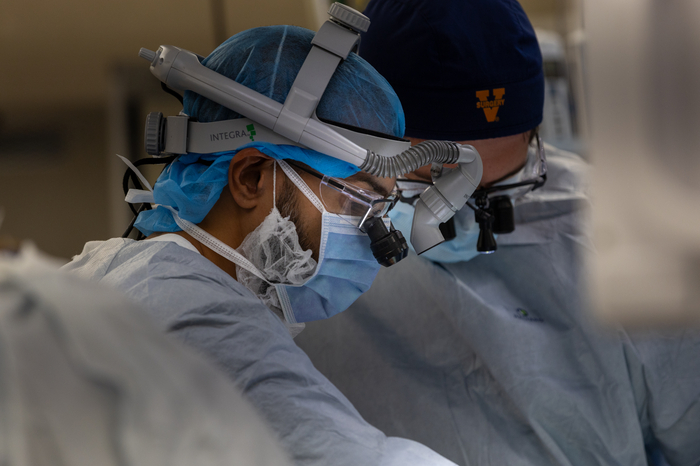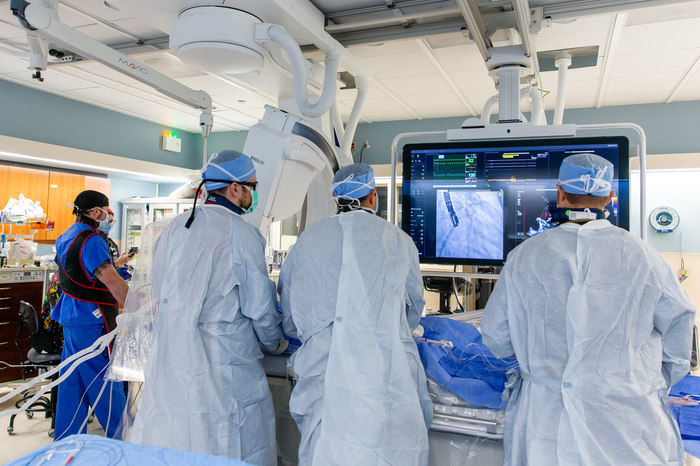Heart Valve Disease
Heart Valve Disease
Heart Valve Disease
Heart valve disease affects how your heart valves open and close. Most heart valve conditions are treatable, sometimes with minimally invasive procedures.
One of the most common heart valve problems in adults is stenosis, when the valve is narrowed. We treat this and all other heart valve diseases here at Carilion Clinic. In fact, we have a huge program focused on treating the heart's structures, including valves.
Heart valve disease affects how your heart valves open and close. Most heart valve conditions are treatable, sometimes with minimally invasive procedures.
One of the most common heart valve problems in adults is stenosis, when the valve is narrowed. We treat this and all other heart valve diseases here at Carilion Clinic. In fact, we have a huge program focused on treating the heart's structures, including valves.
Your heart has 4 valves:
- Aortic valve
- Mitral valve
- Pulmonary valve
- Tricuspid valve
These valves open and close thousands of times, allowing blood to flow through the heart. When they work as they should, blood gets where it needs to go.
But sometimes things can go wrong, including:
- Leaking valves (called regurgitation)
- Narrowed valves (called stenosis)
- Valves didn't grow right (called atresia)
You might be born with valve problems, such as a valve that isn't the right shape. But other heart valve diseases can develop over time. They're sometimes related to other conditions.
Most heart valve conditions are treatable. It's vital to treat them to avoid more serious problems like heart failure.
Symptoms of heart valve disease in adults
You may not have heart valve disease symptoms at first. This is because heart valve problems can slowly worsen. You may mistake some symptoms for normal aging or learn to compensate.
As your valve condition worsens, you may have:
- Trouble breathing, especially when exerting yourself (like climbing stairs)
- Fatigue you can't otherwise explain
- Feeling like your heart is racing or skipping beats
- Heart murmur (which a doctor will be able to hear)
- Chest pain
- Dizziness or fainting, especially when standing up
These symptoms are fairly general and can be symptoms of other conditions. That's why it's hard to know if you have heart valve disease unless you visit the cardiologist.
How we diagnose heart valve disease
The cardiologist will ask about your symptoms and review any risk factors.
Risk factors for heart valve disease include:
- Getting older
- Family history
- Heart disease
- High blood pressure
- Diabetes
- Smoking
Note that some congenital heart valve diseases are passed down from your parents. Learn more about how we treat babies and kids with congenital heart disease.
After the cardiologist listens to your heart, they will likely order an echocardiogram. This non-invasive imaging test shows how well your heart is pumping blood. It can spot valve disease.
What Is Heart Valve Disease?
Your heart has 4 valves:
- Aortic valve
- Mitral valve
- Pulmonary valve
- Tricuspid valve
These valves open and close thousands of times, allowing blood to flow through the heart. When they work as they should, blood gets where it needs to go.
But sometimes things can go wrong, including:
- Leaking valves (called regurgitation)
- Narrowed valves (called stenosis)
- Valves didn't grow right (called atresia)
You might be born with valve problems, such as a valve that isn't the right shape. But other heart valve diseases can develop over time. They're sometimes related to other conditions.
Most heart valve conditions are treatable. It's vital to treat them to avoid more serious problems like heart failure.
Symptoms of heart valve disease in adults
You may not have heart valve disease symptoms at first. This is because heart valve problems can slowly worsen. You may mistake some symptoms for normal aging or learn to compensate.
As your valve condition worsens, you may have:
- Trouble breathing, especially when exerting yourself (like climbing stairs)
- Fatigue you can't otherwise explain
- Feeling like your heart is racing or skipping beats
- Heart murmur (which a doctor will be able to hear)
- Chest pain
- Dizziness or fainting, especially when standing up
These symptoms are fairly general and can be symptoms of other conditions. That's why it's hard to know if you have heart valve disease unless you visit the cardiologist.
How we diagnose heart valve disease
The cardiologist will ask about your symptoms and review any risk factors.
Risk factors for heart valve disease include:
- Getting older
- Family history
- Heart disease
- High blood pressure
- Diabetes
- Smoking
Note that some congenital heart valve diseases are passed down from your parents. Learn more about how we treat babies and kids with congenital heart disease.
After the cardiologist listens to your heart, they will likely order an echocardiogram. This non-invasive imaging test shows how well your heart is pumping blood. It can spot valve disease.
At Carilion, we treat all types of heart valve problems. The conditions we most often see in adults include:
- Aortic stenosis: A narrowed aortic valve opening makes it hard for blood to flow to the rest of the body. The main aortic stenosis symptoms are shortness of breath, fatigue and chest pain.
- Aortic regurgitation: Blood can flow backward when the aortic valve doesn't close tightly enough. It can cause fatigue and shortness of breath.
- Mitral valve regurgitation: The mitral valve doesn't close properly, which can make blood flow backward. Mitral valve regurgitation symptoms include fatigue and heart palpitations.
- Mitral valve stenosis: A narrowed mitral valve opening restricts blood flow on the left side of your heart. It can cause heart palpitations, fatigue and chest pain.
Types of Heart Valve Disease
At Carilion, we treat all types of heart valve problems. The conditions we most often see in adults include:
- Aortic stenosis: A narrowed aortic valve opening makes it hard for blood to flow to the rest of the body. The main aortic stenosis symptoms are shortness of breath, fatigue and chest pain.
- Aortic regurgitation: Blood can flow backward when the aortic valve doesn't close tightly enough. It can cause fatigue and shortness of breath.
- Mitral valve regurgitation: The mitral valve doesn't close properly, which can make blood flow backward. Mitral valve regurgitation symptoms include fatigue and heart palpitations.
- Mitral valve stenosis: A narrowed mitral valve opening restricts blood flow on the left side of your heart. It can cause heart palpitations, fatigue and chest pain.
Without treatment, heart valve conditions can lead to heart failure. This is why we work to diagnose your heart valve disease and create a plan of care.
For some people, this is monitoring symptoms and frequent imaging to check if your condition has worsened.
Nonsurgical treatments
Your cardiologist may start by prescribing:
- Lifestyle changes: Quitting smoking, managing stress and eating heart-healthy foods to reduce the risk of worsening your heart valve disease.
- Medicine: You may need drugs to control high blood pressure, control your heart rate and reduce your risk of blood clots.
Interventional and surgical treatments
We may be able to repair your heart valve problem. This includes procedures such as placing a stent to allow better blood flow. Sometimes, we can also remove calcium deposits to help with blood flow.
However, many people will wind up needing a heart valve replacement. We used to need to do heart surgery to replace any of the heart valves. Now, for the tricuspid and mitral valves, we have some less invasive methods called interventional heart procedures. Some replacements, like of the aortic valve, still require heart surgery.
This includes:
- Transcatheter aortic valve replacement (TAVR): This aortic stenosis treatment replaces your aortic valve without surgery.
- MitraClip: This is a treatment for mitral valve regurgitation. Like TAVR, MitraClip replaces surgery.
Learn more about heart valve disease treatment at Carilion.
How We Treat Heart Valve Disease
Without treatment, heart valve conditions can lead to heart failure. This is why we work to diagnose your heart valve disease and create a plan of care.
For some people, this is monitoring symptoms and frequent imaging to check if your condition has worsened.
Nonsurgical treatments
Your cardiologist may start by prescribing:
- Lifestyle changes: Quitting smoking, managing stress and eating heart-healthy foods to reduce the risk of worsening your heart valve disease.
- Medicine: You may need drugs to control high blood pressure, control your heart rate and reduce your risk of blood clots.
Interventional and surgical treatments
We may be able to repair your heart valve problem. This includes procedures such as placing a stent to allow better blood flow. Sometimes, we can also remove calcium deposits to help with blood flow.
However, many people will wind up needing a heart valve replacement. We used to need to do heart surgery to replace any of the heart valves. Now, for the tricuspid and mitral valves, we have some less invasive methods called interventional heart procedures. Some replacements, like of the aortic valve, still require heart surgery.
This includes:
- Transcatheter aortic valve replacement (TAVR): This aortic stenosis treatment replaces your aortic valve without surgery.
- MitraClip: This is a treatment for mitral valve regurgitation. Like TAVR, MitraClip replaces surgery.
Learn more about heart valve disease treatment at Carilion.
Not only do we offer routine heart care in your neighborhood, but we're also a destination for many specialty surgeries. Carilion offers unique programs and heart treatments in our region, drawing people from across Virginia and neighboring states.

40+ years of heart surgery
The area's largest and most experienced heart surgery program, we were the first to offer open heart surgery. We do 5,000 minimally invasive heart procedures like TAVRs every year in the area’s most experienced heart catheterization lab.

Destination for the latest heart failure treatments
Ventricular assist devices (VAD) are heart pumps that save or extend the life of people with heart failure. As the only VAD Center of Excellence in Western Virginia, we have the highest level of training in using VAD.
Why Choose Carilion Clinic?
Not only do we offer routine heart care in your neighborhood, but we're also a destination for many specialty surgeries. Carilion offers unique programs and heart treatments in our region, drawing people from across Virginia and neighboring states.
Get Care at Carilion Clinic
Your path to better health starts here. Explore comprehensive care options and find the support you need for every step of your wellness journey.
Get Care at Carilion Clinic
Your path to better health starts here. Explore comprehensive care options and find the support you need for every step of your wellness journey.
Get Care at Carilion Clinic
Your path to better health starts here. Explore comprehensive care options and find the support you need for every step of your wellness journey.
Get Care at Carilion Clinic
Your path to better health starts here. Explore comprehensive care options and find the support you need for every step of your wellness journey.

